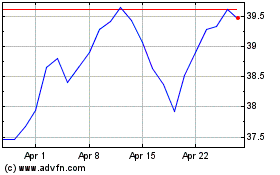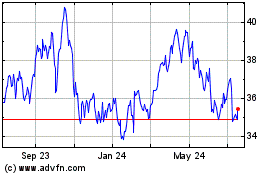BP Boosts Its Bet on Trees
December 16 2020 - 1:29AM
Dow Jones News
By Ryan Dezember
BP PLC has bought a controlling stake in the largest U.S.
producer of carbon offsets, doubling down on a bet that preserving
forests will be key to companies meeting their carbon-reduction
goals.
The oil giant in late 2019 made a $5 million venture investment
in Pennsylvania's Finite Carbon, which helps landowners sell their
forests as carbon sinks. With majority ownership of Finite, BP
plans to take global the business of paying landowners not to cut
down trees.
BP and Finite didn't disclose financial terms of the latest deal
but said that the forestry firm was now part of the energy
company's Launchpad. The unit functions similarly to a
private-equity firm by taking big economic stakes in businesses
with an eye toward steering them through expansion.
"Finite Carbon has the potential to build a global platform for
managing and financing natural climate solutions," said David
Eyton, BP's executive vice president of innovation and
engineering.
BP itself has been one of the world's biggest buyers of forest
carbon-offset credits, a type of climate-change currency. The
company has spent hundreds of millions of dollars on offsets to
comply with California regulators. They operate a so-called
cap-and-trade system that aims to reduce greenhouse gasses by
making it more expensive over time for companies operating in the
state to pollute.
In California's system, preserving forests with centurylong
conservation pacts is rewarded with credits, each representing a
metric ton of carbon sequestered in trees that landowners have been
paid not to cut.
BP is wagering that cap-and-trade will spread. Meanwhile, there
is a growing, speculative market for what are known as voluntary
offset credits. Such credits are created under guidelines similar
to California's strict rules but not used for regulatory compliance
-- at least not yet.
For now, voluntary offsets are mainly used by companies wanting
to cancel out emissions on their own carbon ledgers. The billions
of dollars piling up in ESG funds, which promise to invest with
ecological and social responsibility in mind, has sent companies
racing to reduce their emissions and make up for those they cannot
avoid. Companies including Amazon.com Inc., Apple Inc. and Royal
Dutch Shell PLC. have promised carbon neutrality in the coming
decades.
BP, targeting carbon neutrality by 2050, says it is annually
responsible for 415 million metric tons of carbon emissions,
between its operations and the burning of its oil-and-gas output by
drivers and power plants. Beyond ensuring ample supply of offsets,
energy firms like BP are equipped with trading desks that can
capitalize on broader demand for carbon credits.
Energy firms and others are working to develop carbon-capture
technology that sucks carbon dioxide from the atmosphere and
stashes it underground. Doing so is thus far uneconomical and
untested at scale, though. When it comes to carbon sequestration,
trees are nature's known quantity.
Like other forestry consultants, Finite sizes up trees on behalf
of landowners. But instead of estimating what sawmills will pay for
the timber, Finite's foresters measure trees to estimate biomass
and thus how much carbon is being stored on properties.
Finite has created and sold offset credits on behalf of
landowners. They include a railroad, Maine's Passamaquoddy tribe,
Appalachian coal concerns, land trusts and timberland management
organizations, which pool investors' cash to buy forests.
Finite says its clients have been paid more than $500 million
not to cut down trees, mostly by buyers using the offsets to
operate in California. Finite has been responsible for more than
45% of all forest offsets issued by the state since cap-and-trade
started in 2013, according to California Air Resources Board
data.
The firm used BP's earlier investment to hire foresters and
build an online platform that helps smaller landowners sell
voluntary credits by eliminating much of the legwork and expense of
enrolling large tracts in the California program.
Carbon-conscious companies' demand for voluntary credits has
lately swamped the 20-person firm, said Sean Carney, who founded
Finite with financial backers in 2009 and will remain chief
executive. BP's bigger investment will enable Finite to continue
adding foresters and expand into forests around the world.
"They're doubling down, and we're staffing up," Mr. Carney said.
"BP has operations in 70 countries; we're not planning to be in all
countries over night, but that's a start."
Write to Ryan Dezember at ryan.dezember@wsj.com
(END) Dow Jones Newswires
December 16, 2020 01:14 ET (06:14 GMT)
Copyright (c) 2020 Dow Jones & Company, Inc.
BP (NYSE:BP)
Historical Stock Chart
From Mar 2024 to Apr 2024

BP (NYSE:BP)
Historical Stock Chart
From Apr 2023 to Apr 2024
